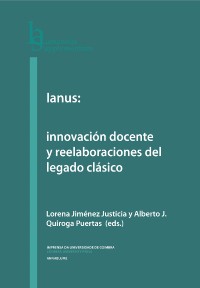Please use this identifier to cite or link to this item:
https://hdl.handle.net/10316.2/44391| DC Field | Value | Language |
|---|---|---|
| dc.contributor.author | Jiménez Justicia, Lorena (ed.) | por |
| dc.contributor.author | Quiroga Puertas, Alberto J. (ed.) | por |
| dc.date.accessioned | 2018-10-31T12:35:00Z | |
| dc.date.accessioned | 2020-03-16T22:34:07Z | - |
| dc.date.available | 2018-10-31T12:35:00Z | |
| dc.date.available | 2020-03-16T22:34:07Z | - |
| dc.date.issued | 2018 | - |
| dc.identifier.isbn | 978-989-26-1593-6 | por |
| dc.identifier.isbn | 978-989-26-1594-3 (PDF) | por |
| dc.identifier.uri | https://hdl.handle.net/10316.2/44391 | por |
| dc.description.abstract | Tradicionalmente, el legado cultural de Grecia y Roma se ha considerado como una fuente inagotable de saberes que ha acabado por conformar los pilares sobre los que se asienta la moderna sociedad occidental. Sin embargo, este es un adagio que precisa de nuevas formas de articularse en una sociedad cada vez más globalizada. En este contexto, creemos que es necesario buscar nuevas metodologías docentes que pongan de manifiesto que la cultura grecolatina sigue siendo indispensable hoy día no solo en el aula universitaria y en el mundo de la cultura sino también en diversas esferas de la sociedad que, a priori, parecerían ajenas al legado clásico. De este modo, además de ofrecer varias propuestas de innovación en la docencia de la lengua y de la cultura del mundo antiguo, el presente volumen persigue poner de manifiesto la presencia del legado clásico en campos tan dispares como el márketing, la lucha por derechos sociales, o la narrativa y dramaturgia contemporánea. | - |
| dc.description.abstract | Greece and Rome have been traditionally labelled as the main pillar and the cradle of Western Civilization. However, this dictum needs to be rephrased in an increasingly globalized and unfair world. In this context, it is neccesary to implement new teaching methodologies capable of underlining the importance of this legacy not only in the interest of Universities and of culture but also in other milieus apparently unrelated to Greece and Rome. Apart from providing with several proposals of teaching innovation in the field of Classics and Ancient History, this book offers insightful contributions into the role of the Graeco-Roman culture in disparate fields such as marketing, the fight for social rights, or contemporary literature and theatre. | eng |
| dc.format.extent | 158 p. | por |
| dc.language.iso | spa | por |
| dc.publisher | Imprensa da Universidade de Coimbra | por |
| dc.publisher | Annablume Editora | por |
| dc.relation.ispartof | Coleção: Humanitas supplementum - estudos monográficos | por |
| dc.rights | open access | por |
| dc.subject | Innovación docente | - |
| dc.subject | legado clásico | - |
| dc.subject | literatura contemporánea | - |
| dc.subject | Teaching innovation | eng |
| dc.subject | Classical legacy | eng |
| dc.subject | contemporary literature | eng |
| dc.title | Ianus: innovación docente y reelaboraciones del legado clásico | por |
| dc.title.alternative | Ianus: teaching innovation and reinterpretations of the classical legacy | eng |
| dc.type | bookIssue | por |
| uc.publication.location | Coimbra | por |
| dc.identifier.doi | 10.14195/978-989-26-1594-3 | por |
| uc.publication.digCollection | PB | por |
| uc.publication.area | Artes e Humanidades | por |
| uc.publication.manifest | https://dl.uc.pt/json/iiif/10316.2/44391/151625/manifest?manifest=/json/iiif/10316.2/44391/151625/manifest | - |
| uc.publication.thumbnail | https://dl.uc.pt/retrieve/8363686 | - |
| uc.publication.parentItemId | 86553 | - |
| uc.itemId | 55069 | - |
| item.grantfulltext | open | - |
| item.fulltext | With Fulltext | - |
| Appears in Collections: | Ianus: innovación docente y reelaboraciones del legado clásico | |
Files in This Item:
| File | Description | Size | Format | |
|---|---|---|---|---|
| ianus.pdf | 5.39 MB | Adobe PDF |  |
Items in DSpace are protected by copyright, with all rights reserved, unless otherwise indicated.
